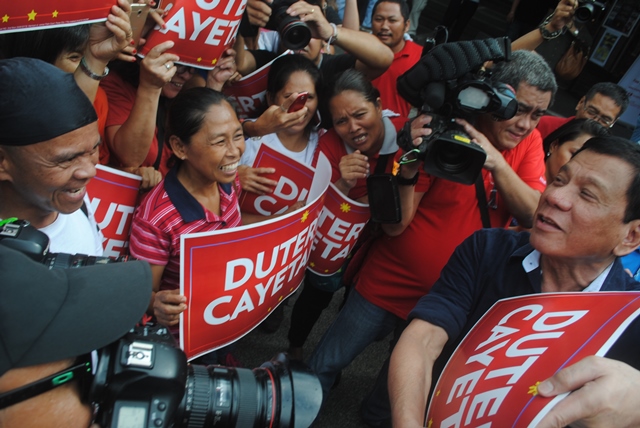Expletives Aplenty: Duterte and the F Word

Rodrigo Duterte, during the CNN Philippines Town Hall in UP Diliman on Feb. 18, 2016. Photo by Lito Ocampo
PRESIDENT-ELECT Rodrigo Duterte’s recent press conferences were, as usual, not devoid of expletives as he denounced the Catholic Church, the media and even the United Nations for a variety of reasons. Duterte has been correctly described as “foul-mouthed” and “tough talking,” showing no restraint in both his statements and criticism of individuals and groups that have drawn his ire even before and even after Election Day. The mayor of Davao City and now the soon-to-be 16th president of the republic is a legitimate and necessary subject of press reporting and comment, but just how far should the media go when it comes to quoting his profanities?
On June 3, the Philippine Daily Inquirer ran a front page story with the headline “Don’t fuck with me, he tells media,” a report on how Duterte lashed out at the media and the call to boycott him after a press briefing on May 31 when he seemed to have endorsed the killing of corrupt journalists.
The Philippine Star also picked up the quote but reported it differently, following usual protocol by running “’Duterte takes on media‘” with the sub headline “Don’t f… with me – Rody” as its banner story. Other papers did not use the quote at all in their headlines. The Standard ran “Rody curses UN” while the Daily Tribune had “Duterte tells UN to shut up” the day after, and while the quote was in the report itself, the two also followed protocols and replaced the rest of the letters.
The following day, the Inquirer ran “In the know: What journalism stylebooks say on reporting obscenities, profanities and vulgarities in print,” referring to the Associated Press (AP) Stylebook, The New York Times Manual of Style & Usage and its own Manual of Editorial Policies, which said that obscenities, profanities and vulgarities must not be used unless part of direct quotations and there is a compelling reason to do so. The AP Stylebook also suggests that “if a full quote that contains profanity, obscenity or vulgarity cannot be dropped but there is no compelling reason for the offensive language, replace letters of an offensive word with a hyphen.”
The Inquirer, however, did not specify the compelling reason that made them decide to run the expletive in full. We can only guess that it was mainly because this is the first time in memory that a president or president-elect uses foul language in his press conferences and public speeches. Besides, part of the reasoning may be that since the public already saw and heard him say it, substituting the rest of F word with hyphens was pointless.
But the press should keep in mind that the journalistic rules they have to abide to apply to them, not news sources. So they have to uphold the standards set by professional practice for what is acceptable speech in public. As TV bleeps out the obscenities, newspapers must use the protocol “f—” or report the use with words “using the F word.” Not to report it is to clean up his language even before he had actually fulfilled his promise to do so.
Echoing his statement right after the elections (“Duterte: Once I’m president, I’ll behave,” Rappler, May 10, 2016), Duterte said in a press briefing on June 2 that he would tone down cursing once he takes his oath of office. “It will be a metamorphosis,” he told reporters. Whether the president-elect will keep this promise remains to be seen. In the meantime, the press should decide that it will not lower prescribed standards to accommodate offensive speech, even if it’s coming from the president’s foul mouth.
Leave a Reply